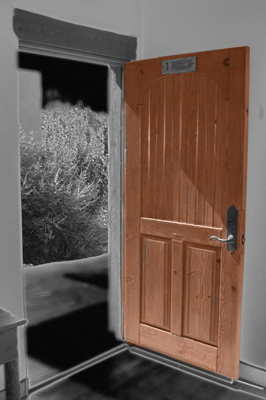 Pedro the dishwasher told me about how his sister died. We were drinking gin at a table by the window. He dried his hands off with a towel, ran his fingers through his black hair and described the way the hot water was still running when he found her hanging from a cord in the shower, how the steam left a cloudy film over her sea green eyes, how the water droplets on her naked, pale body licked up bits of light while she spun like a Christmas tree ornament. “The spinning. That was the worst,” he told me. “It was like she was still alive.” Pedro’s eyes were leaky and brown, already wrinkled and sunken though he was barely thirty. I did not have the strength to tell him of my own sadness.
Pedro the dishwasher told me about how his sister died. We were drinking gin at a table by the window. He dried his hands off with a towel, ran his fingers through his black hair and described the way the hot water was still running when he found her hanging from a cord in the shower, how the steam left a cloudy film over her sea green eyes, how the water droplets on her naked, pale body licked up bits of light while she spun like a Christmas tree ornament. “The spinning. That was the worst,” he told me. “It was like she was still alive.” Pedro’s eyes were leaky and brown, already wrinkled and sunken though he was barely thirty. I did not have the strength to tell him of my own sadness.
We worked at Coco Rocos, a Peruvian restaurant on Fifth Avenue in Brooklyn, near a bar with windows that turned a chemical blue in the evenings. Alvino the manager talked about fucking the waitresses. I was working with a girl named Trixie but Alvino just called her the girl with the stripper name. Hey baby, make me a mojito won’t you? He drank his mojito while we worked. Later, when he lifted his hand in the air, we knew we were to bring him his giant leg of pork, with the marrow browned, sprinkled in cilantro. Sometimes his mother would stop by the restaurant and he would kiss her soft, hairy cheeks all covered in powder, and feed her this green soup with a complicated name, and she would be so proud of her son, so proud of what he had accomplished, getting out of Peru, out of Cuzco—that horrible city, she called it. It was something no one else in her family of five brothers and six sisters had ever accomplished. It was something Grandpa Alvino talked about at night in his rocking chair while watching American tennis on the television, it was what Grandma moaned about while Grandpa touched her rump that was so wide you could eat dinner off it.
Pedro poured the water. Pedro scratched rice into the bin. He took the dirty dishes away and made them clean again. When I looked tired he brought me dessert—the sweetest we served—and fed it to me under the table.
On a Wednesday evening, he grabbed my hand. Don’t tell anyone, he said, I’m leaving tomorrow. I’m going back.
He had ten children, a dog, a grandma named Rosetta. His wife, he said, was small and had long black hair like the sun. Yes, black, but like the sun.
That night a group of Russians stayed late. They were a drunk gang, chewing ice and lifting their arms into the air. They sat at the long table in the back where a bench ran along the wall. The beautiful people sat along this wall.
I was chewing on a banana chip when one of the Russians came up to me and leaned over the bar. He was wearing one of those shirts that wicks away the sweat, and he had the thickest, blondest hair that curled just slightly on the ends and was very dark in that place where it curved, but was otherwise bright and yellow.
He put his elbows on the bar, and nodded towards his wife. She was behind him, gesticulating wildly about their fabulous trip to the Keys. “It’s our anniversary,” he said, his fingers tracing circles on the bar.
“Great. Do you want a drink?”
“Don’t ever get married,” he said, looking at me.
I looked at Pedro. He was standing near the kitchen, smaller than anything in the room, methodically dumping coffee grounds.
The Russian took off his wedding ring and placed it on the bar. It spun, glinting for a moment before it fell silently by some drops of water.
“I don’t want it,” he said.
He walked back to the table. I picked up the ring. I wanted to give it to Pedro, but I could see the man’s wife, how her mouth spread behind a row of martinis, how she looked so old in the blue light that came through the windows at closing time.
—
Jen Percy is an MFA candidate at the University of Iowa. Her essays have appeared in The New York Times, The Indiana Review, The Literary Review, and Best Women’s Travel Writing, among others.
Photo by Pamela Z. Daum
